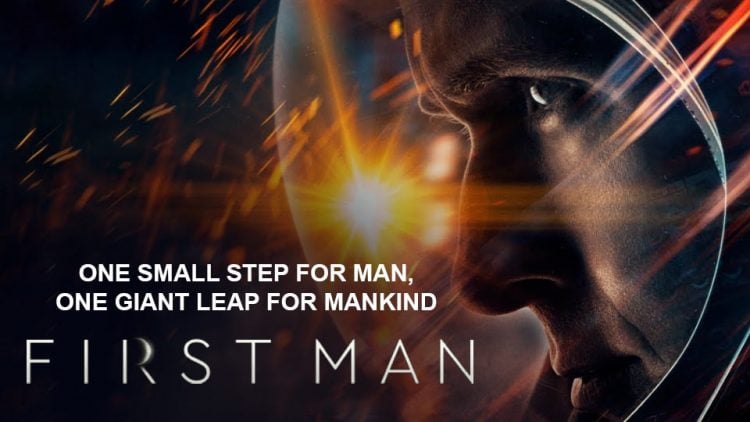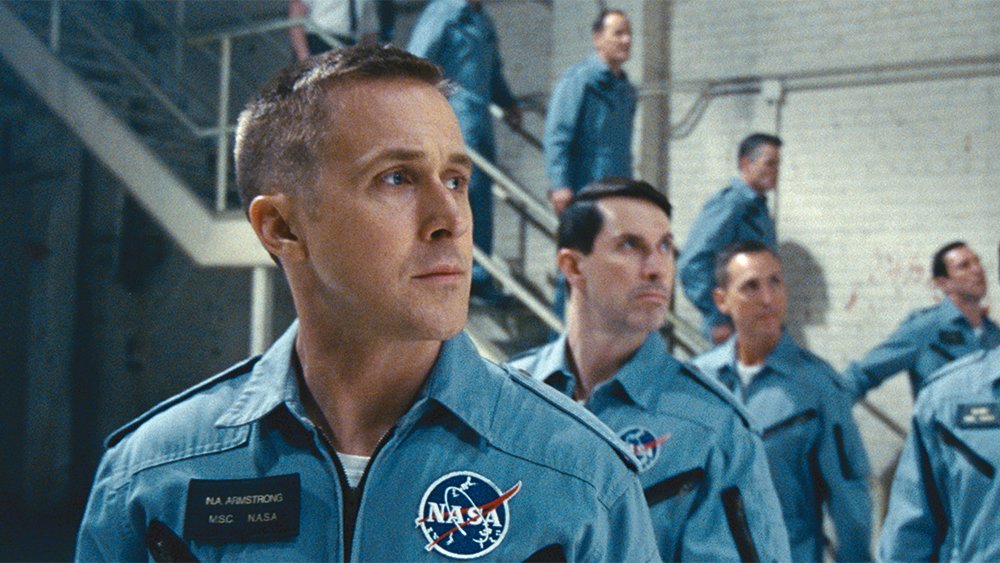
In curious ways, the new biopic ‘First Man’ mirrors the experience of a trip to the moon, alternating between breathtakingly exciting and boring as watching paint dry. Don’t get me wrong, ‘First Man’ is a really good movie and a fascinating insight into the emotional journey of astronaut Neil Armstrong, the first man to step foot on the moon. But it’s also dull at times, heavy with dialog and too reliant on a wooden Ryan Gosling (as Neil Armstrong).
The film explodes into its first action scene with Armstrong, then a test pilot, flying the experimental X-15 jet and being unable to re-enter the atmosphere to land. In its immersive excitement, it reminded me of the powerful opening to both ‘Saving Private Ryan’ and the more recent ‘Dunkirk.’
The jet lands and Armstrong shrugs off his near-death experience. It’s just another day as a test pilot. But he yearns for bigger missions, hoping to join NASA and become an astronaut. In a deep and profound moment, Armstrong’s daughter Karen dies from a brain tumor. It’s quite touching and there were more than a few damp eyes in the theater.
Except for Armstrong himself. Karen’s death is an event Neil just cannot face. Instead he throws himself into his work. A few months later, he’s accepted into the second group of NASA astronauts – one of the few civilians in the program – and the still-grieving family moves to Houston, Texas.
There are so many films about the astronaut program and NASA, ranging from ‘The Right Stuff’ to ‘Apollo 13’ to ‘Marooned‘ that director Damien Chazelle rightly glosses over most of the training program. Instead, the focus is on the interpersonal, on Armstrong’s relationship with the brassy Buzz Aldrin (a wonderful Corey Stoll), quiet Mike Collins (Lukas Haas), Jim Lovell (Pablo Schreiber), Deke Slayton (Kyle Chandler) and Gus Grissom (Shea Whigham).

The space program of the 1960s was almost entirely male and Caucasian a product of its era. That’s reflected in the movie, and even the lead female roles tend to be as adjuncts to the astronauts. Then again, it’s a biopic about Neil Armstrong, not his wife Janet (an understated Claire Foy) or even the grieving wives subsequent to the Apollo 1 disaster. A double feature with the splendid ‘Hidden Figures’ would balance things out nicely.
Of all the sequences that required careful attention to tone, it was the fatal launch test of the Apollo 1 capsule that required the deftest touch. All three of the Apollo 1 astronauts were burned to death when a spark ignited the liquid oxygen that was flooding the cabin and the hatch couldn’t be opened to allow their escape. The hatch was subsequently redesigned while the entire Apollo program was grounded for 18 months, something hinted at in a few closeup shots but not explicitly discussed in ‘First Man.’
Soon enough, the film reaches the Apollo 11 mission. Armstrong, Aldrin and Collins climb into the Apollo 11 capsule with barely any apparent reaction and thus begin the cornerstone of the movie: The flight to the moon. Previous Apollo missions had confirmed all of the necessary technology and maneuvers required for a successful lunar mission, but would it really work?
Armstrong and Aldrin switch to the lunar module, leaving Collins orbiting the moon and praying that the two would return from their trip to the surface. In one of the best sequences in the entire movie, we relive Armstrong’s seat-of-the pants landing as fuel slowly runs out of the LM. After the landing, the one-small-step-for-man step is almost anticlimactic, and the film spends remarkably little time on the moon.
As portrayed by Gosling, the walk on the moon, a massively profound moment for humankind, is just another day for Armstrong. Aldrin famously was deeply and profoundly impacted by seeing the Earth from afar, but while Armstrong was as courageous as any fictional superhero, he remained detached.
And that’s the fundamental flaw in First Man. Armstrong is just soooo cool, so unflappable that even during the most exciting sequences, when the audience is holding its collective breath, he’s apparently unaffected. The result is that the film has no real heart, even if it might well be an accurate portrayal of the famous astronaut.
There’s still lots to like about the movie, not the least of which is a fantastic audio track. Not for the classic 60s music, but for the rollercoaster ride of huge sound for the action sequences interspersed by complete silence when we could hear a pin drop in a jam-packed theater. The visuals are similarly splendid. We’re in the cockpit with Armstrong on the various flights and we also experience the wonder and desolate beauty of the lunar surface with the Apollo 11 crew.
Ultimately, ‘First Man’ is a very good movie and should inspire much new interest in the great adventure of the space program. Let’s get back to the moon! Let’s go to mars! ‘First Man’ also inadvertently serves as a reminder that the best astronauts are those who are calm, cool and collected, even in the face of great and mortal danger. Go see ‘First Man’ on a big screen and theater sound system – it will be well worth your time.
![]()
